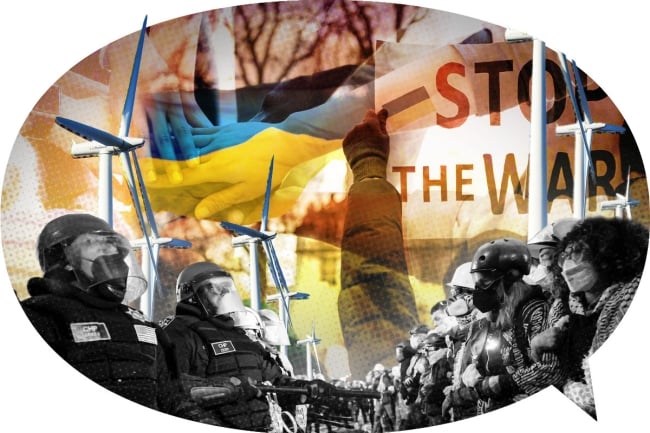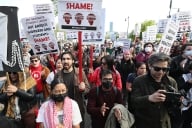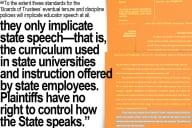You have /5 articles left.
Sign up for a free account or log in.

A new AEI report finds that academic associations are most likely to issue statements on race.
Photo illustration by Justin Morrison/Inside Higher Ed | Etienne Laurent/AFP/Getty Images | Pietro Recchia/SOPA Images/LightRocket/Getty Images | McKinsey/rawpiexel | Pixabay/Pexels
In May, after months of debate, the American Sociological Association passed a resolution calling for “an immediate and permanent ceasefire in Gaza,” joining the chorus of academic associations taking a stand on the Israel-Hamas war.
According to a new study from the American Enterprise Institute, a conservative think tank, that was hardly a surprising position; 81 percent of scholarly societies have issued at least one official statement on one of five subjects—race, Russia’s invasion of Ukraine, the Israel-Hamas war, immigration or climate change—which “almost uniformly reflect progressive orthodoxy,” the report noted.
As a result, the report’s authors argue, colleges and universities should stop giving faculty stipends to pay their fees for association memberships and conferences.
“The whole point of higher ed in a free society is to create room for [scholars] to engage in discourse. They can write op-eds, they can go on radio shows … That’s fine. There’s a First Amendment right to free association in this country,” said Frederick Hess, AEI’s director of education policy studies, who co-authored the report with Jay Greene, a senior research fellow at the Heritage Foundation, another conservative think tank. “But nobody should expect taxpayers to be spending money on that, rather than on the educational function of the university.”
Higher education and policy experts generally agree that the movement for institutional or associational neutrality is gaining momentum, pointing to a recent policy change at Johns Hopkins University as one example.
But what they don’t necessarily agree on is whether neutrality is the best response.
Steve McGuire, a campus freedom fellow at the American Council of Trustees and Alumni, said associations that continue to issue “political statements” will increasingly “stand out, likely drawing negative attention to themselves and hurting their own scholarly purposes.”
Others, including leaders of the American Council of Learned Societies (ACLS) and the American Association of University Professors, believe the AEI report is just part of a conservative push to censor higher education by undermining the groups that uplift faculty voices.
“Contrary to what fellows employed by dark money think tanks might think, statements issued by professional associations aren’t issued willy-nilly by ideologically partisan professors,” Isaac Kamola, director of AAUP’s Center for the Defense of Academic Freedom, told Inside Higher Ed via email. “Academic statements are not simply whipped up within some partisan blender. Rather, they come from organizations led by elected representatives.”
“Societies have a responsibility to address concerns raised by their members, and we believe strongly in protecting their freedom to do so,” ACLS president Joy Connolly wrote in an email to Inside Higher Ed. “The report is disingenuous in suggesting that academic societies deserve defunding based on public statements, which is just one part of what they do.”
‘Problematic’ or ‘Beneficial’?
AEI’s report examined a sample of 99 academic associations, each representing a department commonly found at public flagship institutions. Of those, 80 were found to have issued a statement on at least one of the five subject areas documented. Race or affirmative action was the most commonly cited, with 88 percent taking an official position. More than a quarter of the associations that spoke out had made a statement regarding the Israel-Hamas war. The report does not go into specific detail about each issue investigated, nor does it disaggregate the results by topic or clarify on which side of an issue each group lands. But, Hess said anecdotally, there was little to no variation in perspective, with most taking stances associated with liberal politics.
The report also finds no difference by discipline: groups representing the natural sciences comment just as often—and in some cases more so—than those rooted in the humanities.
“I’m not sure which is worse: Whether it’s an organization that, in theory, is supposed to be studying these questions, and should perhaps leave room for good-faith academic disagreement … or whether it is a statement issued by organizations who have no particular claim to expertise in this area,” Hess said. “Either way, it strikes me as deeply problematic.”
Heather Mac Donald, a fellow at the Manhattan Institute, a conservative think tank focused on individual liberty, described the report’s findings as proof of higher education’s “widespread betrayal of public trust.”
“One would not know it from within the academy, but outside the academy there actually exists evidence and arguments opposing campus dogma on systemic racism, gender bias, and open borders,” she told Inside Higher Ed in an email. “The public funds universities on the naïve assumption that their taxpayer dollars will be directed towards knowledge creation, free from ideological bias. That assumption is incorrect. So the funding itself needs to be rethought.”
Jon Fansmith, the American Council on Education’s senior vice president of government relations, acknowledged that there’s been a public “re-examining” of where and when higher education institutions should speak out—which is “a good thing, especially in a democratic, civil society,” he said. But he said that holding independent, membership-driven academic associations, which serve specific cohorts, to the same standard as the broader institution would harm their very purpose.
“What the tax dollars are supporting is the participation of faculty in training and conferences and other things that strengthen their abilities as educators. That, to me, is a very reasonable—and, frankly, useful—beneficial return,” Fansmith said.
Most faculty would say that political statements are a “minor” part of their association’s impact, he noted, and eliminating stipends for their association involvement on those grounds is a mistake.
“It would be really regrettable if the enormous benefits that these organizations provide was limited or eliminated because some people disagree with conclusions or views that their members have expressed,” Fansmith said. “That seems a fundamental disservice, not only to the organizations, but to the faculty and to the students they teach.”
Forcing a Higher Bar
In the report, Hess and Greene estimate that public universities—and by extension, taxpayers—give the academic associations cited for making politicized statements more than $160 million a year.
But this figure may be misleading. Jeremy Young, the Freedom to Learn program director at PEN America, argued that the taxpayer point is moot because the vast majority of state governments already prohibit the use of state funds to pay individual member dues to associations.
“That has always been a cost that has been borne by individual scholars rather than by the state. So there’s just nothing to prohibit there,” he said.
Young also noted that AEI’s policy proposal suggests holding higher education associations to a standard that other government-subsidized entities never face.
“Because that scholarly society is expressing a position that is in line with the work of their discipline, AEI is viewing that as political,” he said. “If we were going to apply that to any organization, we would have to say that any corporation that has a contract with the state government whose CEO makes any kind of public statement about any matters of public concern … that those would be similarly excluded from any kind of state funding. And yet, we don’t make that argument, because that’s absurd.”








